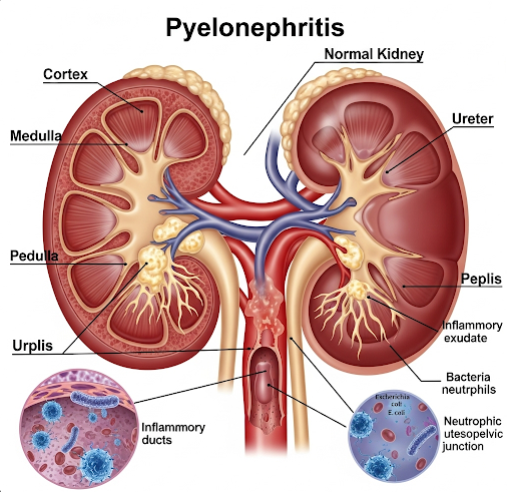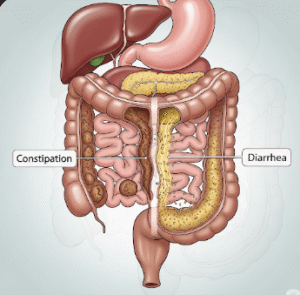Overview
Kidney infection, medically known as pyelonephritis, is a serious bacterial infection that affects one or both kidneys. It often starts as a lower urinary tract infection and ascends to the kidneys, causing inflammation and sometimes permanent damage if untreated. Prompt diagnosis and treatment are vital to prevent complications such as kidney scarring, sepsis, or chronic kidney disease. Korea’s medical centers specialize in early detection and provide advanced antibiotic therapies, imaging, and supportive care for effective management of pyelonephritis.
What Is Kidney Infection (Pyelonephritis)?
Pyelonephritis is an infection of the renal pelvis and kidney tissue caused predominantly by bacteria. It is usually the result of bacteria traveling upward from the bladder through the ureters. The most common causative organism is Escherichia coli (E. coli), though other bacteria such as Klebsiella, Proteus, and Enterococcus species may also cause infection. Pyelonephritis can be acute or chronic; acute pyelonephritis presents with sudden symptoms, while chronic pyelonephritis is recurrent or persistent infection leading to kidney damage.
Symptoms
Common symptoms of pyelonephritis include:
- High fever, often above 38.5°C (101.3°F)
- Chills and sweating
- Pain or tenderness in the flank or lower back on the affected side
- Frequent, urgent, or painful urination
- Cloudy or foul-smelling urine
- Nausea and vomiting
- General malaise and fatigue
- Sometimes blood in the urine (hematuria)
- In severe cases, confusion or signs of sepsis
Causes
Pyelonephritis typically occurs when bacteria from a bladder infection (cystitis) ascend the urinary tract to infect the kidneys. Factors contributing to kidney infection include:
- Urinary tract obstruction (e.g., kidney stones, enlarged prostate)
- Vesicoureteral reflux, where urine flows backward from bladder to kidneys
- Catheter use or urinary instrumentation
- Weakened immune system
- Female anatomy, as women have shorter urethras facilitating bacterial entry
- Diabetes and other chronic illnesses increasing infection risk
Risk Factors
- Female sex due to anatomical predisposition
- Pregnancy, which changes urinary tract anatomy and function
- Urinary tract abnormalities or obstructions
- Diabetes mellitus and immunosuppression
- History of recurrent urinary tract infections (UTIs)
- Use of urinary catheters or recent urinary procedures
- Poor hygiene or sexual activity increasing bacterial exposure
Complications
- Kidney scarring leading to decreased renal function
- Chronic pyelonephritis and recurrent infections
- Abscess formation within the kidney or perinephric space
- Sepsis and septic shock from systemic spread of infection
- High blood pressure secondary to kidney damage
- Increased risk of preterm labor in pregnant women
Prevention
- Prompt treatment of lower urinary tract infections to prevent spread
- Adequate hydration to flush bacteria from the urinary tract
- Proper personal hygiene, especially for women
- Avoidance of unnecessary catheterization and ensuring sterile technique
- Regular monitoring and treatment of underlying urinary tract abnormalities
- Managing diabetes and other chronic conditions effectively
Treatment Options in Korea
Korea’s healthcare system provides comprehensive management for pyelonephritis using the latest diagnostic and therapeutic protocols:
- Antibiotic Therapy: Early initiation of appropriate antibiotics based on urine culture and sensitivity testing is essential. Oral antibiotics may be sufficient for mild cases, while intravenous antibiotics are used for severe infections or hospitalized patients.
- Imaging Studies: Ultrasound or CT scans help identify complications such as abscesses or obstruction requiring intervention.
- Supportive Care: Adequate hydration, pain management, and monitoring of kidney function are integral to treatment.
- Surgical Intervention: In cases of obstruction or abscess formation, procedures such as drainage or relief of urinary obstruction may be necessary.
- Follow-Up: Repeat urine cultures and kidney function tests ensure resolution of infection and prevent recurrence.
- Patient Education: Korean clinicians emphasize awareness of symptoms, hygiene, and timely medical consultation to reduce infection risks.
Advanced Korean hospitals offer multidisciplinary care involving urologists, infectious disease specialists, and nephrologists to optimize recovery and prevent long-term damage.













